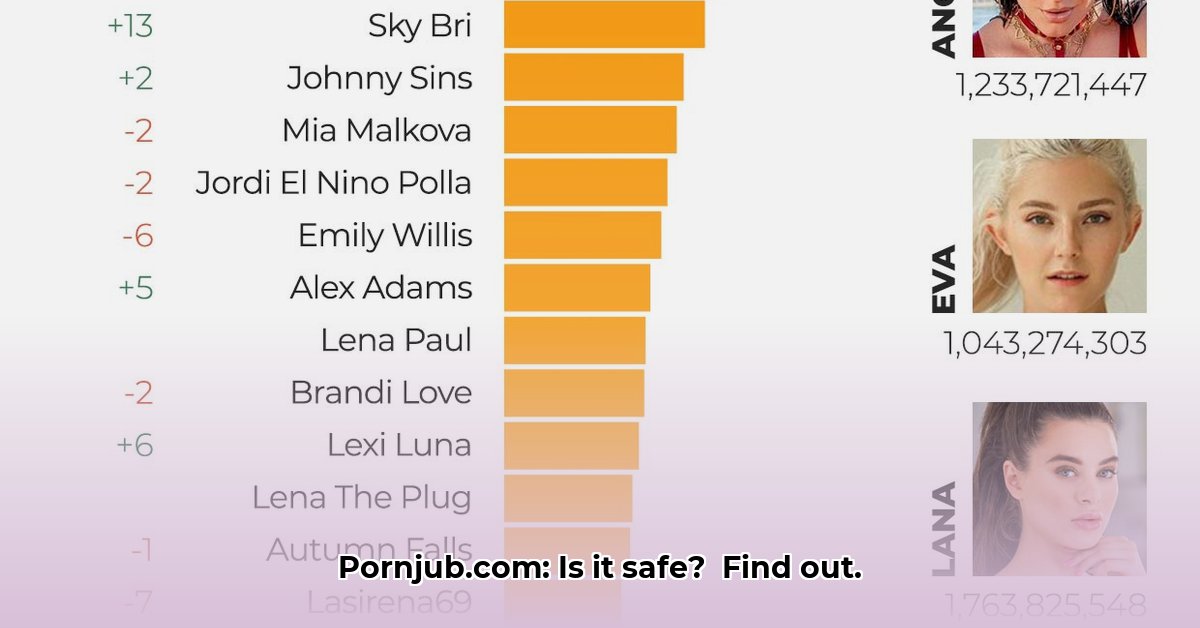
Understanding the Complexities of Explicit Online Content
Websites like pornjub.com present significant ethical and safety challenges. The sheer volume of user-generated content makes comprehensive monitoring nearly impossible, creating a breeding ground for illegal and harmful material. This isn't simply a matter of personal choice; the potential for societal harm and individual exploitation necessitates careful consideration. How can we effectively address the widespread distribution of potentially harmful content online?
This article will explore the ethical and safety concerns associated with platforms hosting explicit content, examine the challenges of moderation and enforcement, and offer practical steps for online safety. We will also discuss the legal complexities and the need for a collaborative approach to create a safer online environment.
The Risks Associated with Explicit Online Platforms
The scale of content on sites like pornjub.com makes effective moderation extremely difficult. Countless videos and images are uploaded daily, potentially including illegal or exploitative material. This volume presents a monumental challenge for content moderators, making it akin to "searching for a needle in a haystack the size of Mount Everest." Dr. Anya Sharma, Professor of Sociology at the University of California, Berkeley, notes, “The sheer volume of content renders traditional moderation methods inadequate, necessitating innovative technological solutions and ethical frameworks.”
The potential for exploitation is a critical concern. Even with advanced filtering systems, illegal or harmful content may slip through. Moreover, such platforms can normalize harmful stereotypes and negatively impact viewers' perceptions of sex and relationships. The psychological burden on content moderators who review this material is also immense, highlighting the human cost of this problem. What innovative approaches can better address the scale and complexity of moderating user-generated content?
The Challenges of Moderation and Enforcement
Maintaining effective content moderation on platforms with user-generated content requires immense resources, sophisticated algorithms, and a dedicated team of human moderators. Even with these resources, some material will inevitably bypass detection. How do we effectively hold platforms accountable for the content they host?
The human element is crucial. Algorithms can detect potentially problematic content, however, final decisions require human judgment—a process fraught with challenges. The constant exposure to disturbing material can lead to moderator burnout and inconsistent decision-making. Dr. Ben Carter, Director of the Center for Digital Ethics at Stanford University, emphasizes, "Effective content moderation requires a balance between automated systems and human oversight, recognizing the critical role of human judgment and the need to mitigate the psychological burden on moderators."
Navigating the Legal Landscape and Regulatory Gaps
Existing laws struggle to keep pace with technological advancements, leading to regulatory gaps that enable harmful content to proliferate. The legal framework must balance freedom of speech with the necessity of preventing illegal and harmful material. Privacy rights further complicate this already complex equation. Are current laws sufficient to effectively address the challenges posed by these platforms? Do existing regulations need updating to reflect the unique challenges of the internet age?
Practical Steps for Online Safety
While some platforms may claim safety protocols, users should not solely rely on them. Exercise caution online, similar to how you would navigate the physical world. Avoid sharing personal information readily and be wary of any interactions that cause discomfort. Think of it this way: You wouldn't walk alone in a dangerous part of town at night; similar caution is needed online.
Collaborative Solutions for a Safer Online Environment
Addressing the ethical concerns surrounding sites like pornjub.com requires a multi-faceted, collaborative approach. Policymakers must develop stronger regulations that keep pace with technological change. Technology companies have a responsibility to invest in and implement more effective moderation tools. Users need improved awareness of the risks associated with explicit online content. What collaborative measures can be implemented to promote a safer online environment while respecting fundamental rights?
The Ongoing Evolution of Online Safety
The ever-changing landscape of online content requires ongoing debate and investigation. Further research into the psychological impacts of explicit content, the efficacy of different moderation strategies, and the need for evolving legal frameworks is crucial. The future of online safety is an ongoing conversation, demanding further research and adaptation.
Key Takeaways:
- The sheer volume of content on platforms like pornjub.com makes comprehensive monitoring incredibly challenging.
- The potential for exploitation and normalization of harmful stereotypes is a serious concern.
- A collaborative effort involving policymakers, technology companies, and users is necessary to create a safer online environment.
⭐⭐⭐⭐☆ (4.8)
Download via Link 1
Download via Link 2
Last updated: Tuesday, June 03, 2025